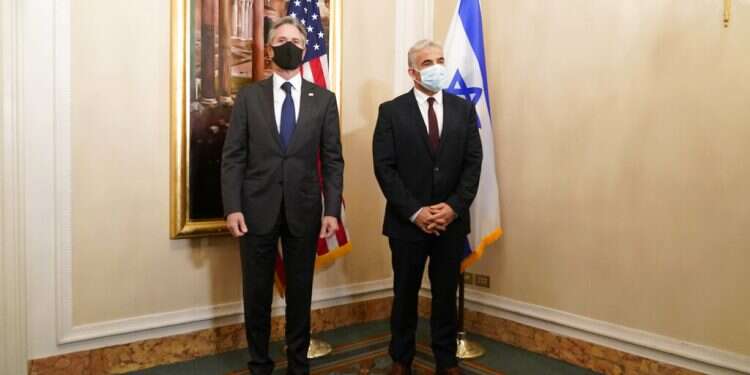Israel's bipartisan standing in the US has been hurt in recent years, but Israel and the US will "fix those mistakes together," Foreign Minister Yair Lapid told US Secretary of State Antony Blinken at a meeting in Rome on Sunday widely hailed as a "reset" for US-Israel relations.
Follow Israel Hayom on Facebook and Twitter
Lapid told Blinken he had spoken with Democrats and Republicans since taking office and had "reminded them all that we share America's most basic, basic values – freedom, democracy, free markets and constant search for peace."
Blinken noted that even though the two governments were new, "the foundation that we're working on is one of an enduring partnership, a relationship, friendship between the United States and Israel."
"We believe the way to discuss those disagreements is through direct and professional conversation, not a press conference," Lapid said.
Both governments will try to preserve Israel's governing coalition, in part by reducing provocations that played a part in sparking last month's Operation Guardian of the Walls against Hamas infrastructure in the Gaza Strip.
At least in the short term, Lapid will be Israel's point man on repairs to the tattered relationship with Biden and the Democrats. The party controls both houses of Congress but is increasingly divided on the Israeli-Palestinian conflict, with progressive members calling for the US to exert more pressure on Israel.
"What they're building now is mutual trust," said Michael Oren, former Israeli ambassador to the United States under Netanyahu. "I expect a change of tone rather than of substance... but there's a possibility that it could produce something better for Israel."
"Israel has some serious reservations about the Iran nuclear deal that is being put together in Vienna," Lapid said, before pledging that Israel would make its objections privately. Netanyahu had loudly and publicly opposed the deal when the Obama administration was negotiating it.
"We have the same objective," Blinken said. "Sometimes we differ on the tactics, and we, I think, are very clear and direct to each other when that's the case and that's exactly how it's supposed to be."
Blinken spoke of the need to resolve the Israeli-Palestinian conflict but did not offer any kind of timetable or any strategy to "offer a more hopeful future for everyone: Palestinians and Israelis alike with equal measures of opportunity and dignity."
And, while the Biden administration supports and hopes to expand on the Trump-era Abraham Accords that normalized relations between Israel and several Arab countries, Blinken said they "are not a substitute for engaging on the issues between Israelis and Palestinians that need to be resolved."
On Monday, outgoing President Reuven Rivlin is to visit Washington at Biden's invitation. A group of House Democrats are planning an official trip to Israel as soon as Congress' July 4 recess.
There is even talk of Lapid and Bennett traveling to Washington later in the summer, separately or together, the officials said. Bennett will serve as prime minister for the first two years, followed by Lapid, the architect of the coalition.
Lapid also met in Rome with Bahrain's foreign minister, Abdullatif Al-Zayani, and is due to visit the UAE on Tuesday and Wednesday.
Lapid described the Abraham Accords as historic and said, "I hope it will be the first of many."
Reuters contributed to this report.
Subscribe to Israel Hayom's daily newsletter and never miss our top stories!




